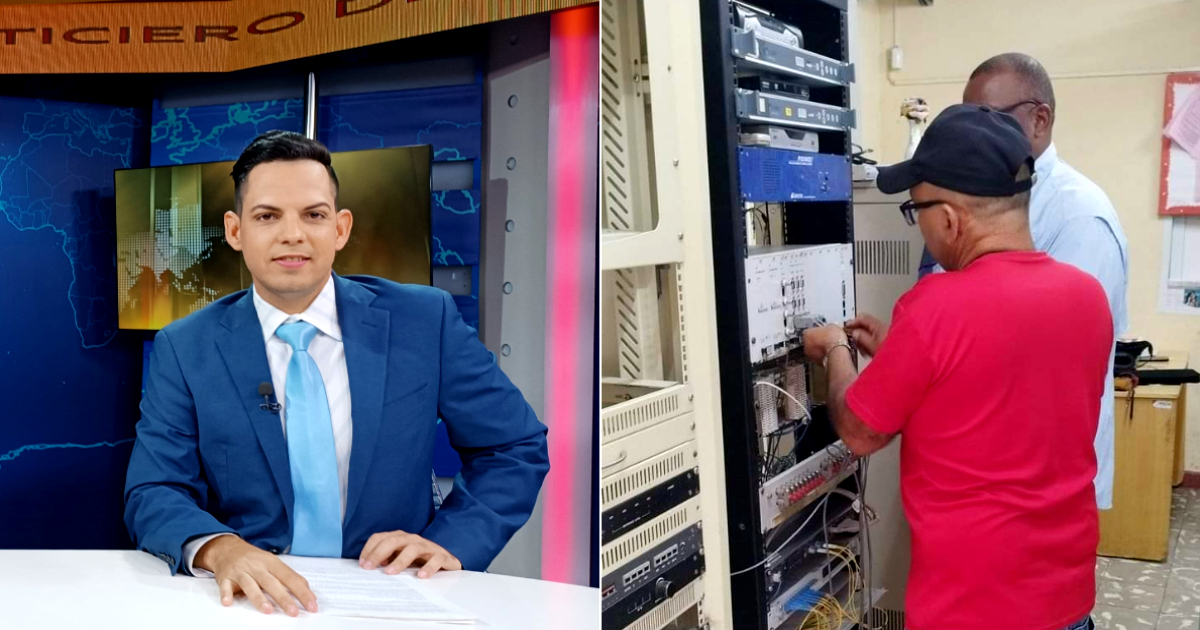
The official journalist Lázaro Manuel Alonso, who reported on new issues with analog and standard digital television signal, admitted that the executives of Cuban Television do not provide detailed information about the causes of the blackout.
Less than 24 hours after a blackout in television signal in Cuba on Sunday night, the happiness was short-lived, as users reported new failures through social media on Monday.
On his social media, Alonso reported that users were reporting issues with the standard analog and digital TV signal from various locations across the country. His post received comments from several internet users who expressed their frustration with the malfunction and their indignation at the lack of information about the causes that led to the failure.
"Everyone replicates the information and no one [says] the causes," lamented Facebook user Raúl Navarro González, who works as a photographer for the Girón newspaper, the official media outlet of Matanzas. His comment was met with sarcasm by Alonso: "Maybe we just don't know them."
In response to such an answer, Navarro González replied to the director of the Noticiero del Mediodía, urging him to gather information from the officials of Televisión Cubana.
"We are journalists... looking for information," she said winking at Alonso, aware that he, in his capacity as an official journalist, cannot ask beyond what is permitted and much less publish any revelations or information obtained unofficially.
Alonso's response highlighted the limits of his profession in the information landscape of the Cuban totalitarian regime. "Yes, we are fools and we haven't asked," said the television presenter, suggesting that if he didn't report the details of the breakdown, it wasn't because he hadn't asked, but because the officials of Televisión Cubana hadn't given him the information.
Two other Cuban internet users intervened in the exchange between the two pro-government journalists. The user identified on Facebook as José Miguel Sánchez Peralta asked: “And where is the official sanctioned for not providing timely information? Or why was the communication law created? To sanction those who speak badly of the revolution?”
For his part, the user identified as Yunior Expósito Eckelson concluded: “Respected journalism seeks, investigates... We will have to wait until they give us the approved information that must be provided.”
It is not the first time that Alonso has subtly expressed criticism of the Cuban regime's communication policy on his social media. Winner of the Juan Gualberto Gómez Award from the Union of Journalists and Writers of Cuba (UPEC) in the television specialty, Alonso allowed himself to publish a text in July 2022 in which he reported on the suffering of the inhabitants of Pinar del Río due to the indiscriminate blackouts they were enduring.
A month earlier, he referred on his social media to the "unequal" distribution of blackouts among Cubans, highlighting the "privilege" of those in the capital, who are less affected by the planned electricity supply cuts.
In March 2021, Alonso, one of the faces of the regime's television news alongside Humberto López, received the Juan Gualberto Gómez award for "work of the year," following his attacks on the theme "Patria y Vida."
The jury highlighted Alonso's "ability" to address with honesty and exceptional brilliance the landmark events of the country and to honor, no less, "the sense of public service of journalism."
Alongside López, Alonso has been one of the most active communicators in the "special" campaigns of discredit and defamation that independent activists, artists, and journalists on the island suffer simply for not adhering to the totalitarianism supported by the government.
In fact, for the award presentation, the jury considered "the ideological challenges faced by Cuban journalism professionals." One of Alonso's most notable outbursts was against the song "Patria y Vida." In the segment dedicated to it, the journalist stated with an impassive expression that "Patria o Muerte is the only option."
What do you think?
COMMENTFiled under: